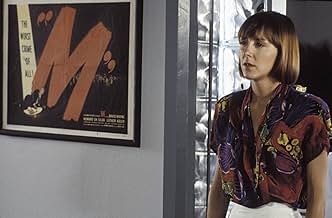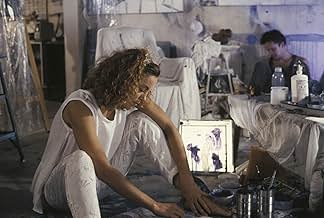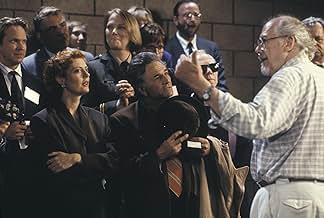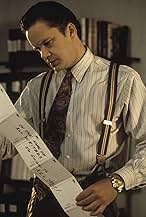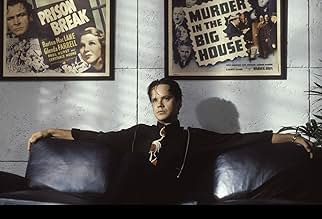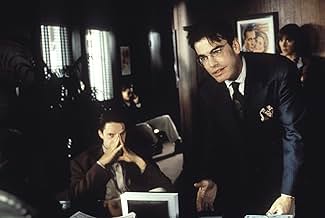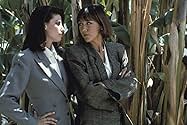हॉलीवुड स्टूडियो के एक एग्जिक्यूटिव को एक लेखक ने जान से मारने की धमकी दी है, जिसकी स्क्रिप्ट उन्होंने ठुकरा दी थी।हॉलीवुड स्टूडियो के एक एग्जिक्यूटिव को एक लेखक ने जान से मारने की धमकी दी है, जिसकी स्क्रिप्ट उन्होंने ठुकरा दी थी।हॉलीवुड स्टूडियो के एक एग्जिक्यूटिव को एक लेखक ने जान से मारने की धमकी दी है, जिसकी स्क्रिप्ट उन्होंने ठुकरा दी थी।
- 3 ऑस्कर के लिए नामांकित
- 24 जीत और कुल 33 नामांकन
फ़ीचर्ड समीक्षाएं
'The Player (1992)' is a meta and witty inside-joke, jabbing at the ribs of tinsel-town in a cynical yet comedic way, and it manages to sardonically satirise the entire studio system, with a only little bit of self-aggrandising and perhaps an equal measure of self-deprecating. The picture isn't particularly funny, though it can cause some chuckles, but is instead the kind of sly smile inducing mockery that takes its time to dawn on you and isn't immediately obvious. It's this undercurrent that carries the flick much more than the main plot itself, so much so that the actual narrative becomes a part of the running gag as opposed to a vehicle for the individual jokes to spawn from. It's a unique, and somewhat acquired taste of a, film that's usually enjoyable and equally intelligent. 7/10
Robert Altman gets under my skin. His films are worthy of great respect, yet they are frequently as irritating as they are brilliant. The Player is, as much as Short Cuts, a quintessential Altman film. It is also one of the best roles Tim Robbins has ever enjoyed.
This film is about Hollywood's dark underbelly. The Player eviscerates its subject by twisting justice, political gamesmanship and artistic integrity into new configurations. For non-film-buffs or non-professionals some of the humor may seem too subtle to notice. To film buffs and insiders, the humor is totally over the top.
Robbins plays a young studio exec who is playing the game to win and seems, at least part of the time, to have a conscience. Everything is going along fine for him until he starts receiving threatening calls and letters from a writer whose screenplays he has rejected, and an arch-rival is promoted to a position just above his own. Paranoia and real danger seem in the periphery of every scene in his life, as the make-believe of his industry and the reality of his life begin to blend freely.
Robbins makes a character who could easily have been totally unlikeable somehow sympathetic. Despite his amazing performance, liking the character makes you feel as if you should go stand in a shower and exfoliate for an hour or so. He is supported by excellent supporting work all around. Especially good are the two major women's roles - played by Greta Scachi and Bonnie Sherrow, and veteran camp character Dean Stockwell.
The photography is liberally and amusingly lifted from several classic thrillers, mysteries and dramas, and comes off fresh and original - not at all like a DePalmaesque bit of visual plagiarism. And the pace is brisk.
The Player is probably my favorite Altman film, and it is easily my favorite Tim Robbins film. It's entertaining, intelligent and, well, it has a bad attitude. See it some night when you're angry and you need a good dark laugh.
This film is about Hollywood's dark underbelly. The Player eviscerates its subject by twisting justice, political gamesmanship and artistic integrity into new configurations. For non-film-buffs or non-professionals some of the humor may seem too subtle to notice. To film buffs and insiders, the humor is totally over the top.
Robbins plays a young studio exec who is playing the game to win and seems, at least part of the time, to have a conscience. Everything is going along fine for him until he starts receiving threatening calls and letters from a writer whose screenplays he has rejected, and an arch-rival is promoted to a position just above his own. Paranoia and real danger seem in the periphery of every scene in his life, as the make-believe of his industry and the reality of his life begin to blend freely.
Robbins makes a character who could easily have been totally unlikeable somehow sympathetic. Despite his amazing performance, liking the character makes you feel as if you should go stand in a shower and exfoliate for an hour or so. He is supported by excellent supporting work all around. Especially good are the two major women's roles - played by Greta Scachi and Bonnie Sherrow, and veteran camp character Dean Stockwell.
The photography is liberally and amusingly lifted from several classic thrillers, mysteries and dramas, and comes off fresh and original - not at all like a DePalmaesque bit of visual plagiarism. And the pace is brisk.
The Player is probably my favorite Altman film, and it is easily my favorite Tim Robbins film. It's entertaining, intelligent and, well, it has a bad attitude. See it some night when you're angry and you need a good dark laugh.
At times it feels like a period piece or is it that we're so used to the horror. A world populated by the shallowest, opportunistic bunch of ignoramuses the world has ever know. How can art come out of that? I think that when it does it's just an accident of Casablanca proportions. Robert Altman who knows a thing or two about it tells us the horror story with the most everyday approach. Tim Robbins is perfect as that empty designer clothed excecutive with a tinge of self awareness. I had to take a shower after the film was over and remove myself from that world.
"Players only love you when they're playing." --Stevie Nicks
Griffin Mill, whose name has a kind of ersatz Hollywood feel to it (cf., D. W. Griffith/Cecil B. De Mille), is not a player with hearts so much as a player with dreams. He is a young and powerful film exec who hears thousands of movie pitches a year, but can only buy twelve. So he must do a lot of dissembling, not to mention outright lying, along with saying "We'll get back to you," etc. This is what he especially must say to writers. And sometimes they hold a grudge. In this case one of the rejected writers begins to stalk Griffin Mill and send him threatening postcards. And so the plot begins.
Tim Robbins, in a creative tour de force, plays Griffin Mill with such a delightful, ironic charm that we cannot help but identify with him even as he violates several layers of human trust. The script by Michael Tolkin smoothly combines the best elements of a thriller with a kind of Terry Southern satirical intent that keeps us totally engrossed throughout. The direction by Robert Altman is full of inside Hollywood jokes and remembrances, including cameos by dozens of Hollywood stars, some of whom get to say nasty things about producers. The scenes are well-planned and then infused with witty asides. The tampon scene at police headquarters with Whoopi Goldberg is an hilarious case in point, while the sequence of scenes from Greta Scacchi's character's house to the manslaughter scene outside the Pasadena Rialto, is wonderfully conceived and nicely cut. Also memorable is the all black and white dress dinner scene in which Cher is the only person in red, a kind of mean or silly joke, depending on your perspective. During the same scene Mill gives a little speech in which he avers that "movies are art," a statement that amounts to sardonic irony since, as a greedy producer, he cares nothing at all about art, but only about box office success. His words also form a kind of dramatic irony when one realizes that this movie itself really is a work of art. As Altman observes in a trailing clip, the movie "becomes itself." The Machiavellian ending illustrates this with an almost miraculous dovetailing. This is the kind of script that turns most screen writers Kermit-green with envy.
Incidentally, Joe Gillis, the Hollywood writer played by William Holden in Sunset Boulevard--personifying all unsuccessful screen writers--actually does call during the movie, but Mill doesn't recognize the name and has to be told he is being put on, further revealing the narrow confines of his character.
In short, this is a wonderfully clever, diabolically cynical satire of Hollywood and the movie industry. This is one of those movies that, if you care anything at all about film, you must see. Period. It is especially delicious if you hate Hollywood. It is also one of the best movies ever made about Hollywood, to be ranked up there with A Star is Born (1937) (Janet Gaynor, Fredric March); Sunset Boulevard (1950); A Star is Born (1954) (Judy Garland, James Mason); and Postcards from the Edge (1990).
I must add that in the annals of film, this has to go down as one of the best Hollywood movies not to win a single Academy Award, although it was nominated for three: Best Director, Best Adapted Screenplay and Best Editing. I suspect the Academy felt that the satire hit a little too close to home for comfort.
(Note: Over 500 of my movie reviews are now available in my book "Cut to the Chaise Lounge or I Can't Believe I Swallowed the Remote!" Get it at Amazon!)
Griffin Mill, whose name has a kind of ersatz Hollywood feel to it (cf., D. W. Griffith/Cecil B. De Mille), is not a player with hearts so much as a player with dreams. He is a young and powerful film exec who hears thousands of movie pitches a year, but can only buy twelve. So he must do a lot of dissembling, not to mention outright lying, along with saying "We'll get back to you," etc. This is what he especially must say to writers. And sometimes they hold a grudge. In this case one of the rejected writers begins to stalk Griffin Mill and send him threatening postcards. And so the plot begins.
Tim Robbins, in a creative tour de force, plays Griffin Mill with such a delightful, ironic charm that we cannot help but identify with him even as he violates several layers of human trust. The script by Michael Tolkin smoothly combines the best elements of a thriller with a kind of Terry Southern satirical intent that keeps us totally engrossed throughout. The direction by Robert Altman is full of inside Hollywood jokes and remembrances, including cameos by dozens of Hollywood stars, some of whom get to say nasty things about producers. The scenes are well-planned and then infused with witty asides. The tampon scene at police headquarters with Whoopi Goldberg is an hilarious case in point, while the sequence of scenes from Greta Scacchi's character's house to the manslaughter scene outside the Pasadena Rialto, is wonderfully conceived and nicely cut. Also memorable is the all black and white dress dinner scene in which Cher is the only person in red, a kind of mean or silly joke, depending on your perspective. During the same scene Mill gives a little speech in which he avers that "movies are art," a statement that amounts to sardonic irony since, as a greedy producer, he cares nothing at all about art, but only about box office success. His words also form a kind of dramatic irony when one realizes that this movie itself really is a work of art. As Altman observes in a trailing clip, the movie "becomes itself." The Machiavellian ending illustrates this with an almost miraculous dovetailing. This is the kind of script that turns most screen writers Kermit-green with envy.
Incidentally, Joe Gillis, the Hollywood writer played by William Holden in Sunset Boulevard--personifying all unsuccessful screen writers--actually does call during the movie, but Mill doesn't recognize the name and has to be told he is being put on, further revealing the narrow confines of his character.
In short, this is a wonderfully clever, diabolically cynical satire of Hollywood and the movie industry. This is one of those movies that, if you care anything at all about film, you must see. Period. It is especially delicious if you hate Hollywood. It is also one of the best movies ever made about Hollywood, to be ranked up there with A Star is Born (1937) (Janet Gaynor, Fredric March); Sunset Boulevard (1950); A Star is Born (1954) (Judy Garland, James Mason); and Postcards from the Edge (1990).
I must add that in the annals of film, this has to go down as one of the best Hollywood movies not to win a single Academy Award, although it was nominated for three: Best Director, Best Adapted Screenplay and Best Editing. I suspect the Academy felt that the satire hit a little too close to home for comfort.
(Note: Over 500 of my movie reviews are now available in my book "Cut to the Chaise Lounge or I Can't Believe I Swallowed the Remote!" Get it at Amazon!)
Griffin Mill (Tim Robbins) is a studio executive who listens to about fifty thousand pitches for films a year, but can only green light twelve, and even then he doesn't get the final say on whether or not a movie gets made. So not being a nice guy to begin with, he figures he's probably made enemies of quite a few people who never got past the gate that he keeps. Then he starts getting threatening letters on his windshield, delivered at the studio, etc. From a writer angry that he said he'd call him about his idea and never did. Mill decides that the angry writer must be David Kahane, and so one night he goes to a movie theater where Kahane is watching "Bicycle Thieves", they talk, then they go get drinks at a restaurant, but then Kahane starts angrily mocking him on the way to their cars and Mill beats him to death in a fit of rage. Stunned at what he did, Mill tries to make it look like a robbery and then leaves.
But this is not a noir - Mill doesn't panic or lie. When the police question him he admits that he met Kahane, admits their relationship, admits everything except the murder. The police suspect him from the start but he doesn't let their harassment get to him. On top of that the harassing letters continue - he killed the wrong writer.
I thought this film was hilarious. It is just so other-worldly with people having very odd reactions, almost like a David Lynch film, so that at times I think Mill is just daydreaming. But, no, these people really did say or do these weird things. And then there are all of the celebrities who are sometimes playing themselves and sometimes are playing a character in the film. And if you want to know why Lyle Lovitt of all people is playing a cop here you have to see the hilarious final scene. Basically the moral of this movie is, in the words of "Crimes and Misdemeanors" - " if you want a happy ending, you should see a Hollywood movie."
But this is not a noir - Mill doesn't panic or lie. When the police question him he admits that he met Kahane, admits their relationship, admits everything except the murder. The police suspect him from the start but he doesn't let their harassment get to him. On top of that the harassing letters continue - he killed the wrong writer.
I thought this film was hilarious. It is just so other-worldly with people having very odd reactions, almost like a David Lynch film, so that at times I think Mill is just daydreaming. But, no, these people really did say or do these weird things. And then there are all of the celebrities who are sometimes playing themselves and sometimes are playing a character in the film. And if you want to know why Lyle Lovitt of all people is playing a cop here you have to see the hilarious final scene. Basically the moral of this movie is, in the words of "Crimes and Misdemeanors" - " if you want a happy ending, you should see a Hollywood movie."
क्या आपको पता है
- ट्रिवियाThe celebrity cameos were not written in the script. Robert Altman added them all in. No scripted dialogue was given to any celebrity with a cameo.
- गूफ़When Mill reads the newspaper story about the murder, a closeup of article reveals that it is just the same few paragraphs printed over and over.
- भाव
Griffin Mill: It lacked certain elements that we need to market a film successfully.
June: What elements?
Griffin Mill: Suspense, laughter, violence. Hope, heart, nudity, sex. Happy endings. Mainly happy endings.
June: What about reality?
- क्रेज़ी क्रेडिटTim Robbins, Fred Ward and Cynthia Stevenson all enter the film when their names appear in the opening credits.
- इसके अलावा अन्य वर्जनIn the theatrical version there was a frontal nude scene of Tim Robbins at the hotel in the desert. This scene was removed for the cable version.
टॉप पसंद
रेटिंग देने के लिए साइन-इन करें और वैयक्तिकृत सुझावों के लिए वॉचलिस्ट करें
- How long is The Player?Alexa द्वारा संचालित
विवरण
- रिलीज़ की तारीख़
- कंट्री ऑफ़ ओरिजिन
- भाषा
- इस रूप में भी जाना जाता है
- El ejecutivo
- फ़िल्माने की जगहें
- 1921 Westholme Ave, लॉस एंजेल्स, कैलिफोर्निया, संयुक्त राज्य अमेरिका(June Gudmundsdottir's house)
- उत्पादन कंपनियां
- IMDbPro पर और कंपनी क्रेडिट देखें
बॉक्स ऑफ़िस
- बजट
- $80,00,000(अनुमानित)
- US और कनाडा में सकल
- $2,17,06,101
- US और कनाडा में पहले सप्ताह में कुल कमाई
- $3,02,216
- 12 अप्रैल 1992
- दुनिया भर में सकल
- $2,17,06,547
- चलने की अवधि2 घंटे 4 मिनट
- रंग
- ध्वनि मिश्रण
- पक्ष अनुपात
- 1.85 : 1
इस पेज में योगदान दें
किसी बदलाव का सुझाव दें या अनुपलब्ध कॉन्टेंट जोड़ें




